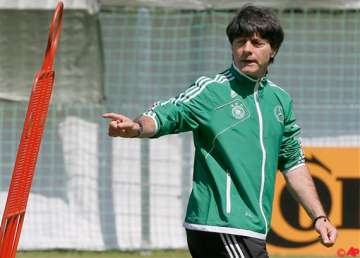Poland, Jun 19: It's about the Euros, not the euro.
Although Chancellor Angela Merkel is Germany's most prominent fan, coach Joachim Loew picks the lineup. And at the same time, Loew is happy to stay out of politics ahead of a potentially highly charged European Championship quarterfinal match against Greece.
The Greek public has been angered by Merkel's tough stance in the Greek debt crisis, insisting on strict austerity measures in return for a bailout. The media in the two countries already have started trading barbs ahead of the match.
Germany's mass-circulation Bild newspaper commented Tuesday: “Be happy dear Greeks, the defeat on Friday is a gift. Against Jogi Loew, no rescue fund will help you.”
Greece is the most troubled country in the eurozone and Germany is the largest contributor to the various bailout and firewall schemes.
Berliner Kurier newspaper printed a cartoon Tuesday of a government spokesman telling the German press “our stance on Greece remaining in the eurozone depends entirely upon how the quarterfinal goes.”
Loew refused to be drawn into a political debate Tuesday, saying the football side was already tough enough and that Germany expected Greece to be a “difficult and uncomfortable” opponent.
“We (the team) have a close relationship (with Chancellor Angela Merkel), but she has no say in picking the lineup and we don't want to mix in politics,” Loew said.
Merkel often has attended Germany's big games but she has a meeting in Rome on Friday and is unlikely to make it to Gdansk.
On the Greek side, the players have told to stay away from the political angle. But that hasn't stopped everyone from talking about it.
“We're not playing for ourselves. We play for the country, for 11 million people, who are waiting for a smile,” Celtic striker Georgios Samaras said Tuesday. “They went out on the streets to celebrate when we beat Russia. And we're really, really happy about that.”
The German players are also trying to steer clear of the topic, with Germany defender Holger Badstuber saying the political aspect of the match was irrelevant.
“We are only looking at the match,” Badstuber said. “We leave the politics to others.”
Friday's game in Gdansk will be almost a home game for the Germans, who have been based outside the Baltic city for two weeks. With Poland out of the tournament, local support could go to Germany, which has two Poland-born players, Miroslav Klose and Lukas Podolski.
“We are very happy to be playing ‘at home.' We always hoped that we would be playing here,” Loew said. “We've had a very positive experience since our arrival.”
